- Home
- Gore Vidal
Death in the Fifth Position Page 3
Death in the Fifth Position Read online
Page 3
I have always had a personal superstition that when something begins badly it will end well and vice versa. Since that night I have discarded the superstition of a lifetime for this particular evening began badly and ended tragically.
The pickets arrived at seven-thirty, twenty well-fed veterans of the First World War; they were quiet but grim and their placards suggested in red ink that Wilbur go back to Russia if he liked it so much there. I had already telephoned the photographers, tipping them off; all publicity is good is my conviction and I had a scheme by which we might eventually be able to make considerable capital out of the veterans. Mr. Washburn took a dark view of this but I reassured him. I even wrote him a little speech to make to the audience right after Swan Lake, before Eclipse, saying that Jed Wilbur was a hundred per cent patriot and so on.
The trouble began, officially, after Swan Lake when one of the girls collapsed in the wings and had to be carried up to her dressing room.
I was standing beside Alyosha Rudin to stage right when this happened.
“What’s the matter with her?” I asked.
The old man sighed. “A foolish girl. Her name is Magda … a little heavy to be good dancer but she has the heart.”
“You mean she has a weak heart?”
Alyosha chuckled. “No, she is passionate. Shall we go out front?”
On our way we passed Mr. Washburn. He was dressed in white tie and tails and his glittering skull looked pale to me in the dim light of backstage. He was very nervous. “I don’t think I’ll be able to go through with it,” he said in a voice which trembled.
“With what?” I asked.
“The curtain speech.”
“Courage, Ivan,” said Alyosha. “You always say that; then, when the time comes, you have the courage of a lion.”
“All those people,” moaned Mr. Washburn, moving toward the lavatory.
Alyosha was a pleasant companion and most knowledgeable of ballet; as he should be since, like Eglanova, he is a genuine Russian dating back to the Fall of Rome … perhaps even to the pyramids for he is very old with the classic Russian greyhound head: hair brushed back, long features and eyes like gray metal. He looked very old-world and distinguished in a smoking jacket of mulberry velvet. We found ourselves two seats in the front row.
“What was wrong with that girl?” I asked when we were seated. Already I was beginning to think of a press release … dancer upset by pickets: lover killed in Korea.
“She will have baby,” said Alyosha.
“But she shouldn’t be dancing if she’s pregnant.”
“The poor child. She must. She has no husband and her family doesn’t know.”
“Do you know who the father is?”
Alyosha smiled sadly; his teeth were like black pearls. “Sometimes it doesn’t matter,” he said gently.
Then the house lights were turned down and Mr. Washburn made his curtain speech; there was polite applause. Miles Sutton, looking nervous and sick, I thought (we were sitting right behind him), rapped his baton sharply on the music stand and the ballet began.
Artistically, everything went off quite well, according to the critics the next day. Both Martin of the Times and Terry of the Tribune thought Eclipse a triumphant modern work, praising Wilbur, Sutton’s interpretation of the Bartok music, the set designer, Louis and, above all, the ballerina Ella Sutton who, they both felt, gave her finest performance: a dedicated artist to the very end for, when the cable broke thirty odd feet in the air, she maintained complete silence as she fell in fifth position onto the stage with a loud crash, still on beat.
Alyosha who was sitting beside me, gasped and said something very loud in Russian; then he crossed himself as the curtain swept down over the stage and the house lights went on. The audience was too stunned to react. Mr. Washburn came on stage but I missed his announcement for I was already backstage.
Ella Sutton lay in a heap in the middle of the stage, her body curiously twisted, like a contortionist’s. A doctor had been summoned and he was kneeling beside her, his hand on her pulse. The dancers stood in shocked attitudes around the still figure.
Then Ella was pronounced dead (her back was broken) and she was carried to her dressing room. Alyosha ordered the dancers to change for the next ballet, Scheherazade. Mr. Washburn led the doctor away. The impassive workmen struck the set and I suddenly found that I was alone on the stage. Not even Alyosha was in sight.
I wandered down the corridor which led to the north side dressing rooms, but I could find no one. I paused at Eglanova’s room and looked in. It was empty. Everything was in a tangle: costumes, telegrams, press clippings, flowers fresh and dying, all the paraphernalia of stardom. On impulse, I entered, feeling like a small boy who has been deserted in a haunted house. I knew, if I waited long enough, that she’d reappear: her dressing room was the clubhouse of the ballet … at least of the top echelon who, I was told, usually came here to drink hot tea and lemon Russian style and discuss, with some severity, those not present. But the club was deserted. Not even Eglanova’s maid was in sight.
A little worried, I turned to go when, quite by chance, I glanced at the wastepaper basket which stood just inside the door: something glittered underneath the make-up-stained pieces of Kleenex and the dead roses. I bent over and picked up a large pair of brand-new shears.
I have since tried, unsuccessfully, to recall what I thought at that moment. As far as I can recollect I thought, rather idly, that it was curious that a perfectly good set of shears should be thrown out like that, and in Eglanova’s dressing room, too. I had perhaps some vague notion that her maid might have borrowed them from one of the grips and then had absently thrown them out. In any event, I took them out of the dressing room and placed them neatly on top of a tool chest near the north side entrance.
It wasn’t until an hour later, after the performance was over, that I began to worry a little because, by that time, the assistant district attorney had arrived, accompanied by a medical examiner and a detective named Gleason who announced to the assembled company that someone had deliberately cut all but a strand of that wire cable with a pair of shears, or maybe a saw, and that Ella Sutton had been murdered.
The company was kept backstage until nearly dawn. The questioning was conducted by Gleason, an autocratic little man who forbade me to call the press until the first of what proved to be a long set of interviews was concluded.
4
We met, almost by accident on Seventh Avenue at four-thirty in the morning. She looked very demure, I thought, in a plain cotton dress, and carrying a briefcase which contained her ballet clothes. I stopped beside her on the corner and we both waited for the light to turn green. Lonely taxicabs hurtled by; the city was still and a gray light shone dull in the east, above the granite and steel peaks, beyond the slow river.
“Hello, Jane,” I said.
For a moment she didn’t recognize me; then, remembering, she smiled wanly, and her face pale by street lamp, she said, “Are you going to take me out to dinner?”
“What about breakfast?”
“I never get up this early,” she said; and we crossed the street. The light was green. A sudden gust of warm wind came bowling up the alley and I caught her scent as Edgar Rice Burroughs was wont to say: warm flesh and Ivory soap.
“Can I walk you home?” I asked.
“If you want to. I live on Second Avenue.” We walked nine uptown blocks and seven crosstown blocks to the brownstone where she lived. We paused below in the street … the hot wind, redolent of summer and river and early morning, stirred her streaked blond hair as we stood before a delicatessen while the drama of courtship took place. The dialogue, I must admit, was similar to that of every other couple in this same predicament at this same hour in the quiet city. Should we or should we not? was the moon right? and was this wise? or was it love? Fortunately, being a well-trained girl of casual habits, this last point wasn’t worried too much and at last we walked up the two flights to her apartment.
“I never thought such a thing could happen to anybody I knew,” said Jane, lying back on the bed, a pillow under her head. One paper lantern illuminated the room with red and yellow light. The furniture was shabby Victorian, very homelike, with photographs of family and fellow dancers on the walls, over the mantel of the walled-up fireplace. The ceilings were high and the curtains were of faded red plush.
“Do you think it was really murder?”
“That awful little man certainly thought it was. Somebody cut the cable … that’s what he said.”
“I wonder who?”
“Oh, almost anybody,” she said vaguely, scratching her stomach comfortably.
“Don’t tell me now that everybody hated Ella … it would be much too pat.”
“Well, almost everybody did. Oh, she was just terrible. But that’s an awful thing to say … her being dead, I mean.”
“I expect we’ll be hearing a lot about how terrible she was,” I said, moving closer to her on the couch, my cup of tea in my hand (tea was the fiction we had both agreed upon to bring us together).
“Well, she wasn’t that awful,” said Jane, in the tone of one who wants to think only good of others. “I suppose she had her nice side.” Then she gave up. “God knows what it was, though. I never saw it.”
“Perhaps God does know,” I said, rolling my eyes upward. Jane sighed. I moved closer, the teacup rattling in my hand.
“She was such a schemer,” said Jane thoughtfully. “She was conniving every minute of the day. That was why she married Miles … he was the conductor and very important to the company. So she married him and then lo and behold she began to get some leads … though the marriage was always a farce.”
“Didn’t she like him?”
“Of course not … and after the first few months he was on to her, too. Only she’d never let him get a divorce. He was too useful to her, a perfect front …”
“And then he killed her.”
Jane shuddered. “Don’t even think it,” she said in a low voice. “He’s so wonderful … I mean as a conductor; I don’t know him very well outside the theater. Anyway he’s a nice man and Ella was a bitch and I see no reason for him to get in trouble on her account,” she concluded spiritedly, disregarding all ethics in her emotional summary.
“I suppose he’s the likeliest suspect,” I said. I was curious about the whole affair, as anyone would be. It was an unusual experience to be involved in a murder during one’s first day on a new job. Yet, aside from the novelty of my situation, it had occurred to me dimly that some end might be served by this event, that I might somehow be able to make use of this tragedy, an ignoble sentiment certainly but then I belong to an ignoble tribe which trades on the peculiarities and talents of others, even on their disasters.
“I guess so,” said Jane unhappily. “Lord knows he hated her. On the other hand so did a lot of people. Eglanova, for instance.”
“Why? What did she have against Ella?”
“Don’t you know?” And for the first time (but not the last) I received that pitying dancer’s glance which implied that though I might not be entirely a square I was none the less hopelessly ignorant of all that really mattered: the dance and its intricate politics. I said I didn’t know, humbly.
“Mr. Washburn was all set to fire Eglanova this year. She’s practically blind you know. It’s got so even the audience notices it … why they even applaud her when she finishes a pirouette in the right direction … then she’s always losing her partner in Giselle. She’s lucky she’s got Louis. He adores her and he follows her around on stage like a Saint Bernard. If she had any other partner she’d’ve ended up among the violins in the orchestra pit long ago.”
“So Washburn was going to get rid of her?”
“I should say so. Only he acted as though she were retiring of her own free will. We were to end this season at the Met with a Gala Eglanova Evening, to celebrate her thirty-one years as a star; only now … well, I suppose she’ll have to do the next season. You see Ella was all set to take her place.”
“Can’t they get somebody else?”
Jane looked as incredulous as any girl can at five in the morning after a tough night’s performance and a questioning by the police. “You don’t seem to realize that this is the oldest ballet company in the world and that it has to have a prima ballerina assoluta and there’s only a half dozen of those in the world and they’re all engaged like Markova, Fonteyn, Danilova, Toumanova, Alonso … or else too expensive for Mr. Washburn,” she added, deflating somewhat the pretensions of the Grand Saint Petersburg Ballet. I knew already, from personal experience, that Mr. Washburn was a tight man with a dollar.
“So Eglanova might have cut that cable?” The memory of those shears still bothered me; I tried to think of something else … I had not yet mentioned finding them to the police … or to anyone.
“Oh, don’t be silly,” said Jane. But she had no other comment to make about this theory.
“She must’ve been awfully ambitious,” I said sleepily; my eyes beginning to twitch with fatigue.
“Ella? Oh, I’ll say she was. She wanted to do Swan Lake at the Met on opening night … instead of on Wednesday matinees and every night in all cities with a population under a hundred thousand. And she would’ve too.”
“Was she that good?” It was hopeless to ask one dancer about the talents of another but I was thinking of something else now. I paid no attention to what we were saying. My hand was now on top of hers and I was so close to her that I could feel through my own body the quickened beating of her heart.
Jane told me very seriously that Ella had been a good actress and a good technician but that she had always been remarkably unmusical and that if she had not been married to the conductor she would probably never have become a star.
“Did she get on with Louis?” I asked, my lips so close to her cheek that I could feel the warmth of my own breath come back to me.
“I don’t think he ever let her get away with anything. He’s just as vain as she was only in a nice way. Everybody likes Louis. He pads, you know.”
“He what?”
“You know … like a falsie: well, they say he wears one, too, when he’s in tights.”
“Oh, no, he doesn’t,” I said, remembering my little tussle with the ballet’s glamour boy.
“You, too?” She sat bolt upright.
“Me too what?”
“He didn’t … go after you, too, did he?”
“Well as a matter of fact he did but I fought him off.” And I told her the story of how I had saved my honor.
She was very skeptical. “He’s had every boy in the company … even the ones who like girls … I expect he’s irresistible.”
“I resisted.”
“Well …” And then it began.
5
“Jane.” There was no answer. Light streamed into the room but she wore a black mask over her eyes, and nothing else … the sheets lay tangled in a heap upon the floor beside the bed. It was another hot day I could tell. Yawning, I sat up and looked at my watch which I had placed on the night table; I’ve always taken it off, ever since a girl from Vassar complained that it scratched. Ten-thirty.
I lit a cigarette and studied the body sprawled next to me in a position which, in any other woman, would have been unattractive. In her case, however, she could be suspended from a chandelier and she would look good enough to take home right then and there.
I leaned over and tickled her smooth belly, like pink alabaster, to become lyric, warm pink alabaster, gently curved, with hips strong and fatless and lovely breasts tilted neither up nor down nor sagging, but properly centered, the work of a first-rate architect: not one of those slapdash j
obs you come across so often in this life. She sighed and moved away, not yet awake. I then tickled the breast nearest me and she said, very clearly, “You cut that out.”
“That’s not a very romantic way to begin the morning,” I said.
She pulled off her mask and scowled in the sunlight which streamed into the high-ceilinged dusty room. Then she smiled when she saw me. “I forgot,” she said. She stretched.
“I’m scared to look at the papers,” I said.
She groaned. “And I thought it was going to be such a perfect day. It’s so hot,” she added irrelevantly, sitting up. I admired her nonchalance. She was the first girl I had ever known who had been agreeable and affectionate without ever once speaking of love. I decided that I was going to like ballet very much.
“I have a headache,” she announced, blinking her eyes and pressing her temples with her hands.
“I got just the cure for it,” I said, rolling toward her.
She took one look and said, “Not now. It’s too hot.” But her voice lacked conviction and our bodies met as we repeated with even greater intensity the act of the night before, our breath coming in short gasps until, at the climax, there was no one else in the whole world but the two of us on that bed, the sunlight streaming in the window and the springs creaking, our bodies making funny wet noises as the bellies pushed one against the other.
When it was over, Jane went into the bathroom and I lay with my eyes shut, the sweat drying on my body, as blissfully relaxed as that young man in the painting by Michelangelo. But then, in the midst of this euphoria, I decided that I should call Mr. Washburn and get my orders for the day. It was early of course for our business and, in ordinary times, no one would be stirring at this hour during the season but today with a murder on our hands … a murder.… It wasn’t until that moment, lying contented and exhausted on a strange girl’s bed that I realized the significance of what had happened, of what the sudden death of Ella Sutton might mean to all of us, including me, the newcomer, the fool who had found a pair of shears and.…

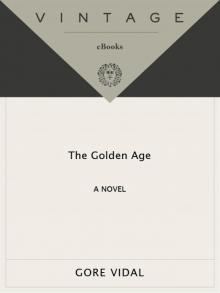 The Golden Age: A Novel
The Golden Age: A Novel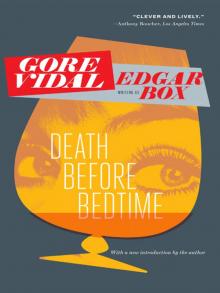 Death Before Bedtime
Death Before Bedtime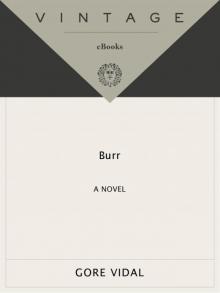 Burr
Burr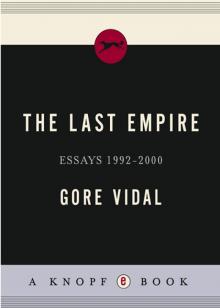 The Last Empire
The Last Empire Empire: A Novel
Empire: A Novel The Selected Essays of Gore Vidal
The Selected Essays of Gore Vidal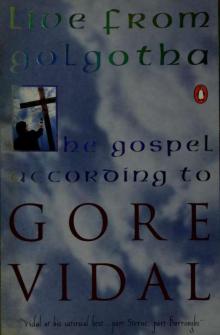 Live From Golgotha
Live From Golgotha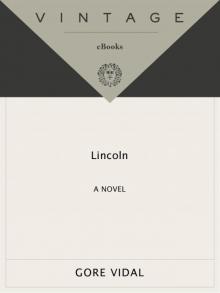 Lincoln
Lincoln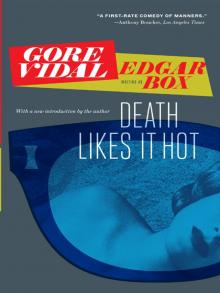 Death Likes It Hot
Death Likes It Hot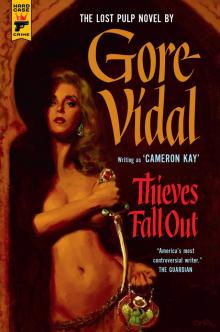 Thieves Fall Out (Hard Case Crime)
Thieves Fall Out (Hard Case Crime)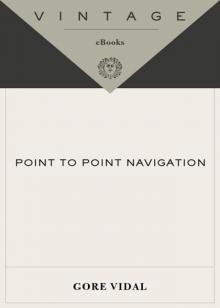 Point to Point Navigation
Point to Point Navigation Williwaw
Williwaw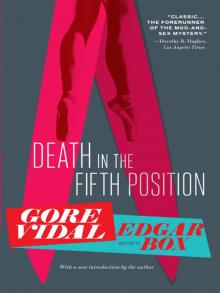 Death in the Fifth Position
Death in the Fifth Position In a Yellow Wood
In a Yellow Wood Julian
Julian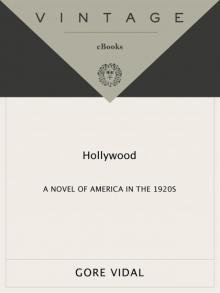 Hollywood
Hollywood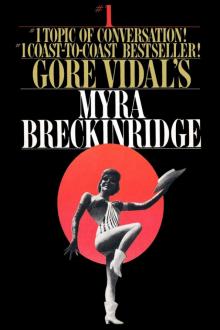 Myra Breckinridge
Myra Breckinridge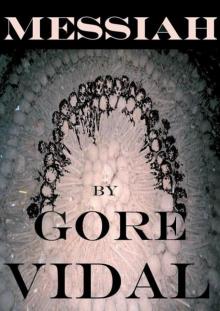 Messiah
Messiah The Second American Revolution and Other Essays 1976--1982
The Second American Revolution and Other Essays 1976--1982 Homage to Daniel Shays
Homage to Daniel Shays Empire
Empire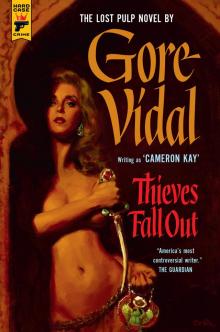 Thieves Fall Out
Thieves Fall Out 1876
1876 The City and the Pillar
The City and the Pillar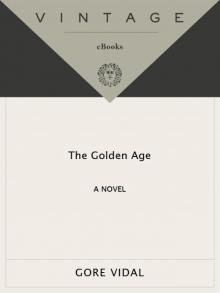 The Golden Age
The Golden Age At Home
At Home